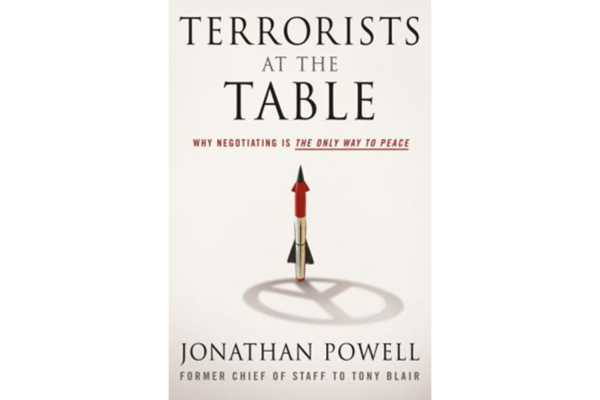Talking to Terrorists

Jonathan Powell, a former British diplomat who gained first hand experience conducting delicate negotiations in Northern Ireland and elsewhere, has written an important book about terrorism, a subject that makes the headlines virtually every day. One would hope that his opus, "Terrorists at the Table: Why Negotiating is The Only Way to Peace," is on the summer reading lists of presidential candidates and Foreign Service officers here and abroad.
Powell, who also was British Prime Minister Tony Blair’s Chief of Staff, augments his own experiences talking to people with blood on their hands with thorough research into modern and historic terrorists movements. He now runs his own NGO dedicated to mediating sticky geopolitical wickets.
Powell’s premise is straightforward and eminently credible: We need to talk and negotiate with our enemies, however vile we find them. Bloviating politicians to the contrary, we have repeatedly done so throughout history and will continue to do so. Consider this: we made common cause with Joseph Stalin, one of history’s baddest characters, to defeat an even worse tyrant.
Talking to bad actors isn’t easy and it doesn’t always work, but it is preferable to the alternative: continuing or escalating violence. Powell avers, “Despite all of these difficulties, when a serious opportunity to talk to terrorists materializes, a government cannot responsibly refuse to seize it.” He cautions that talking should not be confused with giving in to terrorists, and elsewhere adds another aphorism (the book is awash in them): “No group is irreconcilable forever.”
What kind of violence are we trying to avoid? Here’s just a sampling: more than 250,000 deaths in Colombia, more than 100,000 in Sri Lanka, more than 33,000 in Indonesia, according to the author.
So who are among the unpleasant people we have talked to lately? Powell cites General David Petraeus, who came to the conclusion in Iraq that “we would not be able to kill or capture our way out of the industrial-strength insurgency” and who, as a result of this realization, began negotiating with disgruntled Sunni tribesmen, many of whom had only recently been ambushing American soldiers. With the support of then President George W. Bush, Petraeus was largely successful in winning them over; the current mess in Iraq and Syria can be blamed, at least in part, on Sunni dissatisfaction with their Shia rulers in Baghdad and Damascus.
More recently, President Barack Obama secured the release of Sergeant Bowe Bergdahl from the Taliban in Afghanistan in exchange for five prisoners held at Guantanamo. The loyal opposition, of course, deplored this move, and Powell points out that getting one’s own side to agree to a negotiated settlement often is harder than the original negotiations. The nuclear deal with Iran may prove this adage.
Not only have governments reached deals with terrorists, many terrorists have gone on to head governments, including Menachem Begin, who ordered the bombing of Jerusalem’s King David Hotel in 1946, and Jomo Kenyatta of Kenya. The British deemed both terrorists at one point in their careers.
Skeptics well might question whether Powell’s doctrine applies to the likes of ISIS. He clearly believes it does and that the new terrorists aren’t all that much badder than the old ones, such as the anarchists and nihilists that indiscriminately bombed and shot people a century ago, including President William McKinley in 1901. Powell writes, “If you offer terrorists a political way out, then the military pressure can have the desired effect, especially if combined with a sustained effort to address the grievances that underlie the conflict.”
Having wished this book on the likes of Hillary Clinton and Jeb Bush, the reviewer would caution other readers: this is as far from a beach book as it gets. The author allows his voluminous knowledge of the subject to flow freely, piling anecdote upon anecdote, touching on virtually every conflict imaginable in recent decades. With acronyms flying about the pages (ETA, FARC, GAM, SDLP, LTTE) like so much semantic shrapnel, it can be disorienting at times. A more measured and organized approach – sticking to a handful of conflicts, perhaps, as illustrations of his thesis – would have been welcomed.
That said, Powell has made a significant contribution to the understanding of how we can and often do deal with our most adamant opponents.